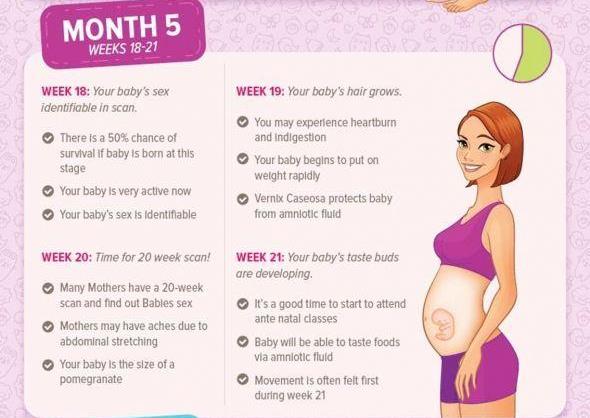You've reached your fifth month of pregnancy! Congratulations! You're now well into your second trimester. You're probably wondering what you can expect at this stage, so let's get into it.
Key Points
- You may feel your baby move for the first time during month five!
- By the end of your fifth month of pregnancy, your baby will be 8 to 12 inches long, and weigh between eight ounces and one pound.
- Your baby will start growing soft body hair, called lanugo, at this stage.
Your Baby in Month Five
The fetus becomes more active now, turning from side to side and sometimes doing somersaults. You may feel your baby's movements for the first time at this stage. The fingernails have reached the tips of the fingers. The fetus now sleeps and wakes at regular intervals. This is a month of rapid growth; at the end of the fifth month of pregnancy, your baby is 8 to 12 inches long and weighs between eight ounces and one pound.
Your baby will gain a greasy coating called vernix caseosa on their skin at this stage; this coating will help protect the skin while your baby begins to grow. They'll start growing soft body hair called lanugo. In biological females, the uterus will form during this month.
Your Body's Changes in Month Five of Pregnancy
Your uterus has grown to the height of your belly button. Your heart beats faster due to increased blood volume. You may need more sleep each night. Take rest breaks during the day if you feel tired. You may get leg cramps if you're not getting enough calcium. Let your doctor know if this happens.
Your breasts may be up to two cups larger at this point. Heartburn and constipation continue to be common side effects experienced at this stage of pregnancy. If they become severe, talk to your doctor. Shortness of breath, dizziness, nosebleeds, and gum bleeding are other common symptoms you can experience during month five.
Prenatal Care at Five Months Pregnant
Visit your doctor or health care provider for your month five checkup. Continue eating a healthy, nutritious diet and drink lots of juice, water, and milk every day. Don't take any dietary supplements without first talking to your doctor. Taking dietary supplements without the guidance of a professional can lead to you overdosing on a given nutrient. This can cause a range of health complications.
Low-impact, low-intensity exercise is great for you and your baby. Walking is generally the most advisable form of exercise at this stage. Talk to your doctor about how much walking is okay for you per day. Avoid any other forms of exercise without first talking to your doctor.
Try to avoid stress as much as you can during this stage. Stress is bad for you and for your baby, and in extreme cases can raise your risk of losing your baby. Set boundaries for yourself and within your relationships. Remember that it's okay to say no. If you feel your stress has become unmanageable, speak to a mental health professional.
Don't buy into any pregnancy fads or myths. There are an abundance of them out there, so be careful. Don't always believe what you read online, even if it sounds reasonable. Buying into a pregnancy fad will have no effect at best, and a negative effect on you or your baby at worst. If you're curious about something you've read about online, talk to your doctor first.
Do not take the content of this article as professional medical advice. It's important to exercise due diligence when obtaining relevant information in matters pertaining to your health. Always consult with your healthcare provider before making any medical decisions.

